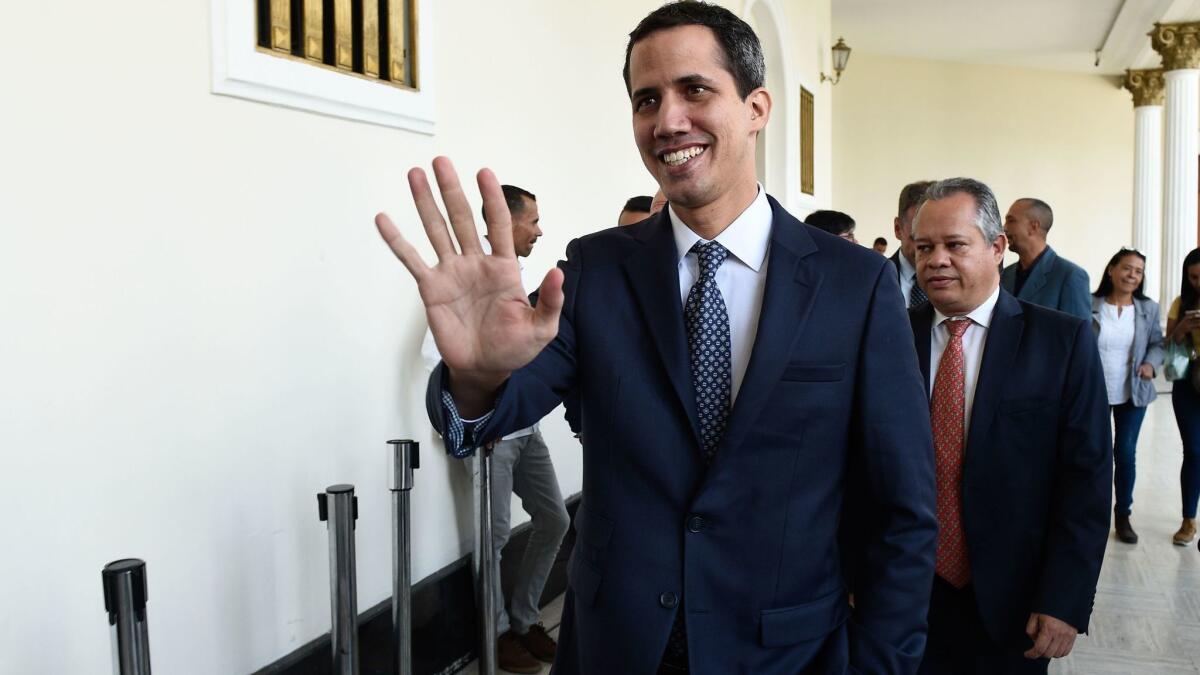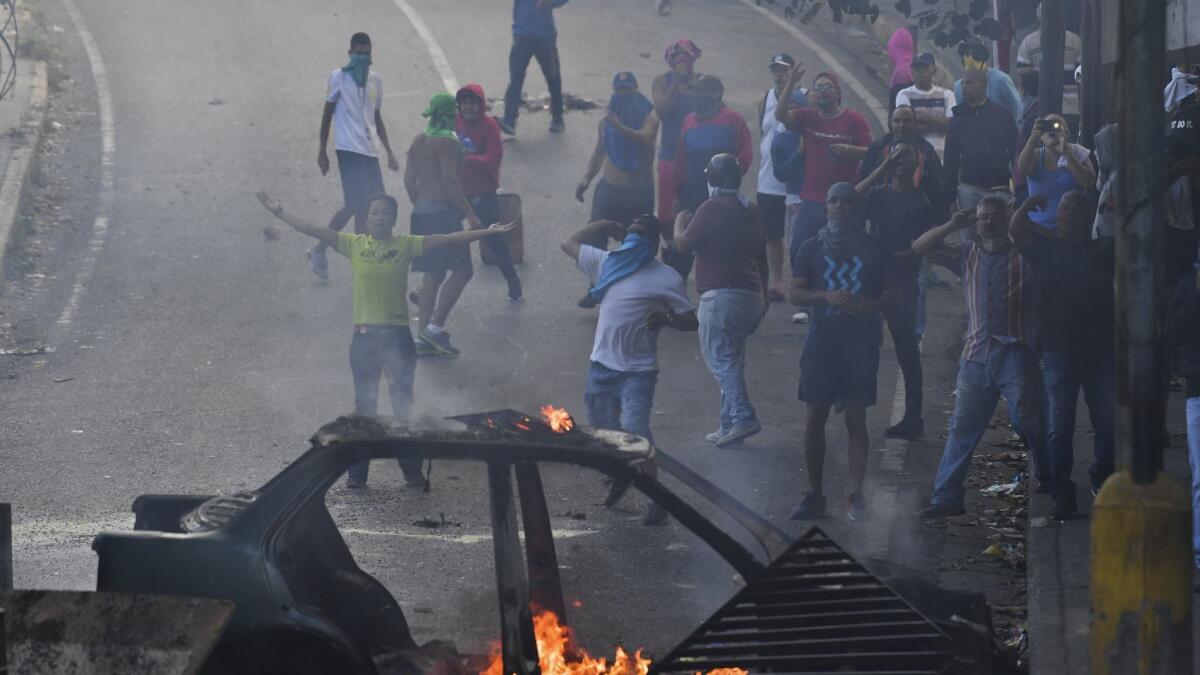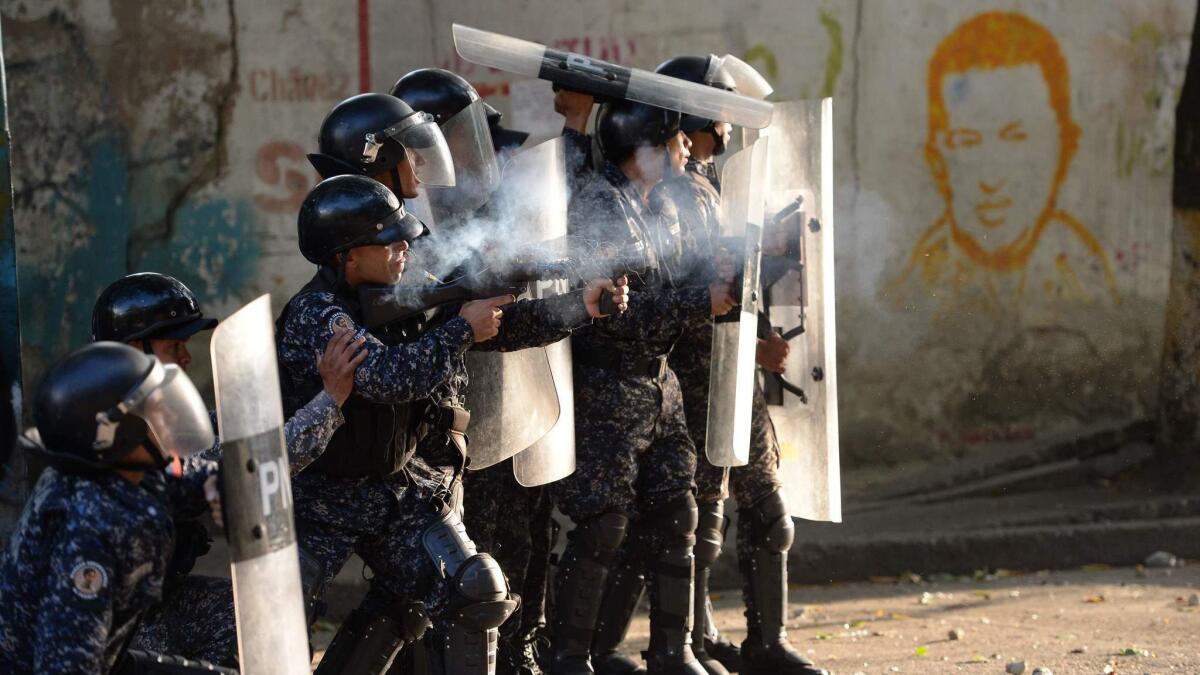As chaos grows in Venezuela, opposition leader calls for national protest

- Share via
Reporting from Caracas, Venezuela — Two days after his security forces put down a mutiny by members of the armed forces, Venezuelan President Nicolas Maduro was facing a new test: A rising star of the opposition called a nationwide protest for Wednesday to force the president to resign.
The size of the protest in Caracas and other cities across the country will be a barometer of the popular support for opposition leader Juan Guaido Marquez, the youthful, newly installed president of the National Assembly. Since taking office, Guaido has tried to energize the dispirited effort to unseat Maduro, who was reelected in a disputed vote in May.
“Our course is clear, [seeking] an end to usurpation, a government of transition and free elections,” Guaido said in a recent social media message.
Guaido has framed the march as a means of repudiating the president, a former bus driver and union leader whose term in office has been marked by economic stagnation, hyperinflation and rising crime and poverty. More than 40 countries, including the U.S., have refused to recognize him as a legitimate president, saying his reelection was rigged.
The march is coming at a critical moment, with Maduro seemingly off balance after several dozen mutinous national guard soldiers stormed a military post in central Caracas, seizing weapons and calling on other members of the armed forces for support. The government quickly put down the uprising, arresting 27 and dismissing it as an isolated incident.
The uprising triggered a wave of street violence and came days after Guaido proposed a new law in the National Assembly promising amnesty to anyone in the armed forces who rises up against Maduro — that is, if and when a new government takes power.

Whether Wednesday’s march will galvanize the nationwide desperation over rising poverty and hyperinflation and turn it into political momentum for Guaido is an open question. Maduro’s decrees and judicial decisions have neutered the opposition-controlled National Assembly, and leadership among his opponents is badly split.
There is little doubt, however, that Guaido’s rhetoric has injected energy into an opposition that has been intimidated by Maduro’s dictatorial maneuvers. Guaido has received supportive messages from the Trump administration, including a video message Tuesday from Vice President Mike Pence.
“Nicolas Maduro is a dictator with no legitimate claim to power,” Pence said. “He has never won the presidency in a free and fair election, and has maintained his grip of power by imprisoning anyone who dares to oppose him.”
The Trump administration has gradually upped pressure on Maduro’s socialist government, ordering sanctions on a number of key Venezuelan leaders and threatening to put a blockade on the country’s oil.
The date of the march is charged with historical significance for Venezuelans. On Jan. 23, 1958, nationwide demonstrations marked the end of Marcos Perez Jimenez’s 10-year dictatorship and augured the eventual reinstatement of democracy.
But the uprising may also give the government an excuse to go after Guaido. Hours after the mutiny, the supreme court declared null and void the decrees issued by the National Assembly under his leadership, including the offer of amnesty and an appeal for international humanitarian aid, something the Maduro government has refused to accept.
“The most deplorable was the declaration that humanitarian aid for Venezuelans is unconstitutional, denying this aid to those who are dying of hunger and who are dying in hospitals for lack of medicines,” Guaido said Monday on social media.

Venezuela’s economy sank to new depths last year with inflation exceeding 1 million percent and the economy shrinking by 15%. Roughly 80% of the people in Venezuela now live in poverty and the lack of jobs, food and medicine have forced an estimated 3 million people — 10% of the population — to flee in search of better lives.
A 35-year-old industrial engineer, Guaido was elected to the National Assembly in 2015 to represent his native Vargas state. He is a close ally of Leopoldo Lopez, a former Caracas borough mayor and harsh Maduro critic who was jailed for more than three years for allegedly inciting demonstrators to violence. He is now out of jail but under house arrest serving the remainder of his 13-year sentence.
Guaido’s criticisms of Maduro through social media and his insistence that the National Assembly retain its powers have attracted attention. Sociologist Trino Marquez described Guaido as a “black swan” and said his emergence as an opposition spokesman is a “welcome surprise.”
“No one expected a youth of 35 could embody the hopes for democratic change and turn himself into the leader that the country was hoping for,” Marquez wrote. “Guaido has to protect himself from the regime but also from some in the opposition for whom politics is not an art but a war game.”
Guaido, though, has yet to inspire universal support. Critics within the fractured opposition say he is inexperienced while Maduro contends he is a puppet for the U.S. Analysts say his support is lukewarm within traditional parties whose leaders fear he may overshadow them. On the other hand, he appeals to a broad cross section of Maduro opponents who desire a generational change to younger leaders.
Many expect Guaido’s increasing hold on public attention will only make him a target for harassment, even imprisonment. Enrique Aristeguieta Gramcko, an attorney and former leader of the 1958 movement, urged Guaido in an open letter to “denounce any threats.”
“If you are threatened or pressured, be it by the regime or representatives of dark interests, denounce it with a clear voice,” Gramcko wrote. “The whole world has expressed its intention to support and protect you. Don’t be afraid to assume the responsibilities that destiny has put in your hands.”
“Don’t let Venezuelans down.”
Special correspondents Mogollon and Kraul reported from Caracas and Bogota, Colombia, respectively. Times staff writer Tracy Wilkinson in Washington contributed to this report.
More to Read
Sign up for Essential California
The most important California stories and recommendations in your inbox every morning.
You may occasionally receive promotional content from the Los Angeles Times.










